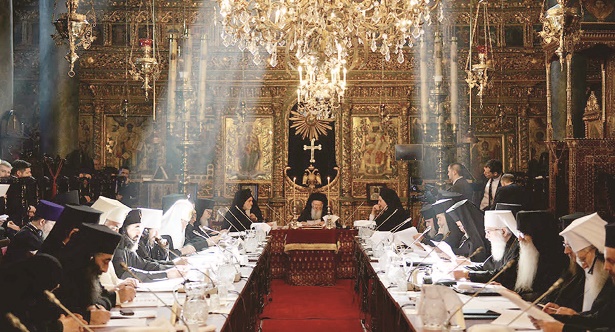An ecclesiological approach on the road to the Holy and Great Synod -2
14 January 2016[Previous Publication: http://bit.ly/1OLW1l1]
This dynamic and creative participation was confirmed by the 3rd Pre-Synod, Pan-Orthodox Meeting in 1986 in Chambésy, as a stage of maturity and the culmination of a new era inaugurated by Ecumenical Patriarch Athenagoras with the Pan-Orthodox conferences. Twenty-five years after the adoption of the issue of the Ecumenical Movement into the agenda of the Holy and Great Synod, and after many significant stages, frank theological deliberations and intense discussions, the time is ripe for a formal, common stance on the part of the Orthodox Churches as regards the Ecumenical Movement. At the 3rd Pre-Synod Meeting, negotiations on the matters of ‘Relations between the Orthodox Church and the Rest of the Christ World’ and ‘The Orthodox Church and the Ecumenical Movement’ were concluded. The final texts, which were adopted unanimously, are the products of profound investigation, deliberation and also boldness. Although they dash any untimely hopes, they are imbued with a substantial affirmation of the ecumenical contacts and their direction, outlining their extent, their quality and their orientation.
In particular, the text on ‘The Orthodox Church and the Ecumenical Movement’, which is up-to-date in its references but timeless in its conclusions, was held to be most positive by the WCC and was considered an important contribution because, as was observed, very few member-churches of the Council have stated so clearly and in such detail the fundamental theological reasons for their participation in it. It is worth noting the following declarations by the 3rd Pre-Synod Meeting: ‘With its deep conviction and ecclesiastical consciousness that it is the bearer and witness to the faith and tradition of the One, Holy, Catholic and Apostolic Church, the Orthodox Church firmly believes that it occupies a central position in the matter of promoting the unity of Christians in the modern world… The Orthodox Church has always wanted to draw the various Christian Churches and Confessions into a common quest for the lost unity of Christians, with the aim that we should all agree on the unity of the faith.
The Orthodox Church prays constantly “for the union of all” and has participated in the Ecumenical Movement from the time of its first appearance, contributing to its expansion and further evolution. In any case, because of the Ecumenical spirit, which is a distinctive feature, it has, throughout history, always fought for the restoration of Christian unity. This is why the Orthodox participation in the Ecumenical Movement is not at all foreign to the nature and history of the Orthodox Church, but is a consistent expression of the Apostolic faith within new historical conditions and in order to meet new existential demands… The multi-dimensional ecumenical activity [of the Orthodox Church] arises from a sense of responsibility and from the conviction that coexistence, mutual understanding, cooperation and common efforts for Christian unity are essential so that “we should not place any obstacle in the way of the Gospel of Christ” (I Cor. 9, 12)’.
The positions of the 3rd Pre-Synod Meeting, which are exceptionally important and fruitful, as well as being of an enduring nature, naturally formed the core of the resolution of the 5th Pre-Synod Meeting of October 2015, with whole paragraphs being repeated word for word. The 5th Pre-Synod Meeting dealt with a revision and final ratification of, among other things, the texts of the 3rd Pre-Synod Meeting which had to do with the relations of Orthodoxy with the rest of the Christian world, as these were expressed in bi-lateral and multi-lateral talks.
The Conference naturally made some supplementary corrections and additions, but accepted the proposals of the Special Inter-Orthodox Commission on the preparation of the Holy and Great Synod (October 2014), which in contrast to the 1st and 3rd Pre-Synod Meeetings, unified items 8) Relations between the Orthodox Church and the rest of the Christian World and 9) The Orthodox Church and the Ecumenical Movement into one, entitled ‘Relations between the Orthodox Church and the rest of the Christian world’, thus avoiding the provocative reference to the ‘Ecumenical Movement’. This term is provocative for extreme circles and groups within Orthodoxy which are nourished by their segregation, and by the idée fixe of polemical conflict against any attempt on the part of the Church to embrace modern reality. It should be noted that at the session of the Special Inter-Orthodox Comission from 30 September to 3 October 2014, powerful voices were raised in favour of a firmer stand on the part of the Orthodox Churches towards the Ecumenical Movement and heterodox Christians. The ordination of women and the attitude of Protestant churches towards homosexuality were used, and continue to be used, by certain Orthodox circles as an alibi to halt, or at least restrict, ecumenical contacts.







